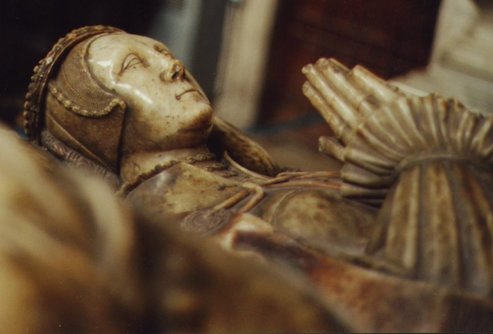I came across this question whilst reading a blog on the Paston family
marry a daughter and sister of dukes? William Paston married Anne Beaufort. I know she is a younger daughter, but still? Status discrepancy?"
and here is the answer
"Hello! I’ve definitely read about the Pastons, although I’m not an expert. As a side note, I think everyone can take
a lesson from the Pastons: keep letters and other items pertaining to your life and you too might become famous
years after your death.
Concerning Anne and William (both younger children): my guess is money and building an affinity. Anne Beaufort’s father
was Edmund Beaufort, the infamous duke of Somerset who died early on in the Wars of the Roses. Edmund was relatively poor in absolute financial terms; the Pastons were an up-and-coming family. It was not entirely uncommon for a wealthy
gentry man to marry a noblewoman. William’s father (also named William, who died in 1444) purchased numerous manors during his lifetime and made the Pastons a substantial family among the Norfolk gentry. In essence, William Paston II,
who married Anne, was the son of a somebody, although his family was not as prestigious as Anne Beaufort’s.
By the time Anne married William Paston, her family’s fortunes were also on the decline. Anne was young when her
father died at the first Battle of St Alban’s, fighting for the Lancastrian side (aka the “wrong” side for many years).
It seems that William and Anne married in the late 1460s, which was during the reign of Edward IV, a Yorkist king.
Anne Beaufort’s family was not in as great a position of power as they had been under Henry VI. Three of Anne’s brothers (Henry, Edmund, and John) were executed or killed in battle for supporting the Lancastrian cause, so Anne was not in the
best position when she came of age for marriage. For Anne, marrying a gentry man would presumably ensure a decent standard of living with less politically-fraught circumstances. For William, it was probably a bit of a social coup to land a noblewoman. For Anne’s brothers, who might have helped arrange the marriage, it was a chance to gather more allies and support in local (Norfolk) politics.I suppose “on paper” the two seem to have a status discrepancy. But since Anne was
married during a time when her family was consistently on the losing side in political battles, marriage with a wealthy gentry man probably sounded pretty good (and might have been her best offer, depending on the exact date of her marriage).
I think that answer is about right.
What do you think?

 RSS Feed
RSS Feed
